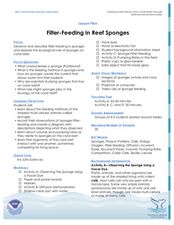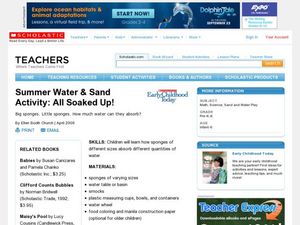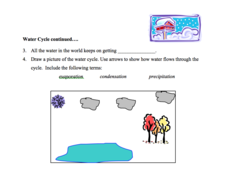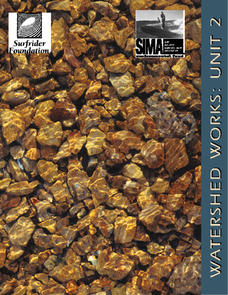Curated OER
Sponge Painting Flowers
Explore the shapes and colors of spring with a flower themed painting project. Included here are a list of materials and the instructions needed to execute an art lesson on sponge painting flowers. Tip: Use in conjunction with a flower...
Curated OER
Earth Science "D" Letter
Play around with earth science vocabulary with this word search. Learners look for 18 earth science vocabulary words that start with the letter D. The resource provides an HTML and PDF version that you can print as well as answer sheet...
Curated OER
Filter Feeding in Reef Sponges
Students investigate the role of sponges in our oceans. In this biology lesson, students create a diagram visualizing how sponges bring food into their bodies through a filtering process. Students discuss the connections between...
Curated OER
Summer Water & Sand Activity: All Soaked Up!
In this lesson, Summer Water & Sand Activity: All Soaked Up!, students experiment with sponges and water. Students analyze how sponges absorb water. Students learn a song to sing during the lesson to help them understand the water...
Curated OER
Science Crossword Puzzles: The Ear
Employ this crossword puzzle as a review activity for ear anatomy. Pupils use 8 clues about the anatomy of an ear to solve the puzzle. Answers are not included with this worksheet; however, since there are only 8 words, it should be...
NOAA
Invertebrates
Crabs and lobsters ... yum! The 18th installment of a 23-part NOAA Enrichment in Marine sciences and Oceanography (NEMO) program focuses on invertebrate marine life. After the lecture slideshow, learners conduct an activity to sample...
Florida Department of Environmental Protection
Build Your Own Aquifer
Ever wondered how an aquifer works? Introduce your class to the amazing way many people get water by exploring how underground aquifers work. Two fun hands-on activities are used to help kids understand what an aquifer is, how it works,...
NOAA
Watch the Screen!
Can a sponge cure cancer? Life science pupils visit the drugstore under the sea in the fifth activity of six. Working groups research the topic then get hands-on experience by testing the inhibiting effects of several plant extracts on...
Cornell University
Bridge Building
Bridge the gaps in your knowledge of bridges. Individuals learn about bridge types by building models. The activity introduces beam bridges, arch bridges, truss bridges, and suspension bridges.
ARKive
Adaptations to Arid Habitats
How do plants and animals survive in habitats with very little water? Explore arid ecosystems and the way their inhabitants have adapted with a lesson and science experiment. After kids listen to a presentation about adaptation, they...
Cornell University
The Physics of Bridges
Stability is key when building a bridge. Scholars explore the forces acting upon bridges through an analysis of Newton's Laws and Hooke's Law. The activity asks individuals to apply their learning by building a bridge of their own.
Curated OER
Filter-Feeding in Reef Sponges
Students make observations and describe the filter-feeding in sponges as it relates to the ecological role of sponges on coral reefs. In this filter-feeding in reef sponges lesson, students are introduced to the feeding methods of...
Curated OER
Classification of an Invertebrate: Sponge
Students investigate the invertebrate sponge. In this invertebrates lesson plan, students observe the sponge, Grantia, using a dissecting microscope. Students answer questions about their observations and view six other invertebrates....
Curated OER
Animals Word Search Puzzle
To make the classic word search more challenging and academic, this animal-terms puzzle has scholars solving clues to determine the words they find. Fifteen clues give detailed definitions of biology terms such as carnivore, reptile,...
Curated OER
Physical Science: Festival of Bubbles
Investigate bubbles through the use of scientific inquiry. Pupils blow bubbles using several methods and measure the resulting bubble print. Measurements are recorded on a data table and transferred to a bar graph. Results are discussed...
Curated OER
Physical Science- Sink or Float?
Learners investigate which objects sink and which ones float. Learners engage in an experiment, make predictions, and record results on a graphic organizer. This is a comprehensive and easy to follow resource.
Curated OER
Take Your Pick of "Beary" Fun Activities.
Students complete an integrated unit on bears. They read numerous books about bears, create a bear puppet, act-out stories, create a polar bear painting, participate in a Teddy Bear Picnic, and conduct a Teddy Bear parade.
NOAA
Seamounts
How do chains of islands form? Young oceanographers explore the mountains of the deep in the final installment in a 13-part series. The interactive compares types of seamounts based on their overall height and height under the water, as...
Curated OER
Water Cycle Lesson Plan
After conducting experiments with a sponge, ice water, and a soda bottle your young scientists become familiar with the water cycle through experiment, song, hand motions and drawing. Learners sing about the water cycle and discuss what...
Curated OER
Effect of Technology on the Environment
There's no doubt that one of the most consistent dangers to our environment is the risks associated with the extraction and shipment of oil. This activity focuses on oil spills - how they happen, the effects they have on the environment,...
Curated OER
Feeding Frenzy
Young biologists take a look at the myriad of ways that animals increase their chances of surviving in the wild. The adaptations help animals hide, hunt, and attract a mate. This lesson specifically explores how insect mouth parts are...
Curated OER
Water, Water Everywhere!
Learners brainstorm on ways they use water, and where water comes from. They view video, Down the Drain, to gain specific facts about water use, properties of water, problems of water and the water cycle. They perform a lab activity...
Curated OER
Watershed Works: Unit 2
The second of a three-unit lesson plan, this focuses on how human-made structures affect watersheds. Using watershed models that were built during the first unit, junior geologists now place buildings, dams, or levees into the models and...
Curated OER
Watershed Works: Unit 1
By constructing a watershed model and identifying watershed features in it, they discover how water erosion changes the landscape. As with most watershed modeling activities, this one is costly in terms of time and materials. It is,...

























